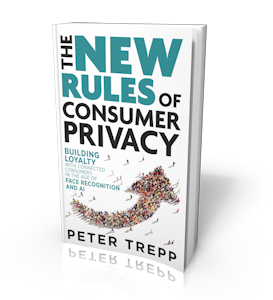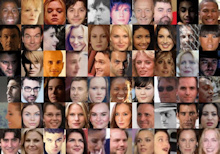In Today's OpEd -
FaceFirst CEO, Peter Trepp Responds to Clearview AI Controversy
 About
a week ago, the New York Times published an article about a largely unknown
facial recognition company called Clearview AI entitled, “The Secretive Company
That Might End Privacy as We Know It”. Articles about facial recognition, good
or bad, usually attract the attention of readers but this one will get
heightened attention and here’s why:
About
a week ago, the New York Times published an article about a largely unknown
facial recognition company called Clearview AI entitled, “The Secretive Company
That Might End Privacy as We Know It”. Articles about facial recognition, good
or bad, usually attract the attention of readers but this one will get
heightened attention and here’s why:
Clearview is one of many companies that have scraped social media websites to
build a large database of faces that it uses to search with a probe image. For
law enforcement, for example, this means that an image of a suspect (the probe
image) can be compared to Clearview’s database of 3 billion (claimed) images in
order to find a possible match and then link it back to the source of the
database image (e.g. from Twitter or Facebook). How did they get 3 billion
images from social media? Hint: It wasn’t by asking for permission from either
the platforms or their users.
It is not trivial scraping images from the big guys; in fact, it’s challenging.
Over the years, social media companies have diligently implemented technical
roadblocks to prevent data scraping. Nevertheless, savvy engineers find their
way around such obstacles. While this endeavor was easier in the past, there is
little stopping determined hackers from collecting this information, even today.
Clearview and its investors, including Peter Thiel (who sits on the board of
Facebook), are building a company that is not concerned with abiding by the
privacy policies and/or laws that are either in place or coming soon. That’s
fine, but both policies and laws will matter a lot less when the court of public
opinion is called to order. Moreover, Clearview should have received a letter
from Twitter by now asking them to cease and desist for having violated the
social network’s policies and demanding that they delete any scrapped images. I
don’t think Clearview with comply because (1) the founder, Mr. Ton-That, is a
technologist, not a Jurist Doctorate, and (2) the data is probably “offshore”
and arguably out of reach of the laws of the U.S.
So, what’s wrong with Clearview’s business model and why have they breached our
social contract? Setting aside the constraints of legislation and social media
policies for a moment, as Mr. Ton-That has apparently done, let’s consider the
perspective of social acceptability and business ethics (assuming these still
exist today). The key issues are:
1. Contributing one’s image to a social media platform and choosing to make it
“public” does not automatically give anyone the right to repurpose that image
regardless of how clever they were in obtaining it. It’s possible that your
image was collected at a time when the policies of your social media platform
were not fully in place yet; that shouldn’t matter.
2. Transparent collection and use of data are essential to the foundation of a
platform that seeks to use its product as a commercial application. This point
should matter both to the collector/seller of the information and the commercial
consumer of the application. Customers should consider the well-known source of
data and carefully evaluate the social impact to engaging with Clearview.
3. Users should be able to easily search and/or opt-out of databases that
contain their image(s). Users should not be required to provide burdensome
personal information in order to opt-out.
Here’s the irony. The very people we entrust to uphold the law may be the one’s
breaking it. It’s been reported that 600 law enforcement agencies are using
Clearview. However, as long as they aren’t technically and/or currently breaking
the law, maybe there is no harm? There are at least two problems with that
argument. First, there is harm in tapping a database that is likely known to
have been built illegally. Second, there will most certainly be significant
public backlash, class action lawsuits and probably some action from Washington
DC.
It’s widely known that legislation typically trails behind most any technology
curve, and for good reason. The job of a law maker is not to be pro-active and
predict the future as much as it is to be reactive and prevent current events
from blowing up and causing certain disaster. It’s hard to predict the future
and have deep domain expertise on all fields, especially highly technical ones.
Predictive powers or not, law makers are working on new legislation. I’ve had
the privilege to visit law makers on Capitol Hill and provide input on a federal
bipartisan bill for facial recognition that is being considered now. I’m in
support of the proposed bill as it is worded today, but I’m under no illusion
that laws will stop Clearview from continuing. What sets FaceFirst aside from
Clearview is that we will never scrap or otherwise illegally obtain images to
build databases. Our customers expect that from us, and we will continue to
deliver on that promise.
Facial recognition is clearly a very powerful tool and is becoming more widely
used every day on its way to ubiquity. However, I don’t think we’re entering a
dystopian world any time soon. From my seat, I am extremely excited about
unlocking a world of helpful, personalized, efficient applications that will
deliver real value to consumers. In the meantime, FaceFirst is striking a
balance between delivering a high-quality product in a legal, ethical and
socially responsible form.
In summary, I hope that Clearview and their customers are thinking carefully
about the future and the impact to society. Clearly, facial recognition is
coming in many forms, some we may not like while others we will wonder how we
got by before it was introduced. Buckle up.
 'The
New Rules of Consumer Privacy'
'The
New Rules of Consumer Privacy'
by FaceFirst CEO Peter Trepp
In
The New Rules of Consumer Privacy: Building Loyalty with Connected Consumers in
the Age of Face Recognition and AI, FaceFirst CEO and author Peter Trepp
has devised a set of rules that will help companies uphold consumers' privacy
without sacrificing their security and convenience. By following these rules,
brands can create a win-win scenario that will maximize revenue, reduce crime,
provide consumers with the best experience possible and ensure that consumers'
privacy is reasonably protected.
Learn more about the book here
Or order it here!
Clearview AI's Scraping Images at the Top of the News
'Facial recognition datasets & controversies drive biometrics news last week'
Clearview AI Worsening Public Anxiety About
Biometrics 7 Data Privacy
 Facial
recognition and controversy around the technology were the theme common to most
of the past week’s top stories on Biometric Update. After a few weeks of
relative calm for facial biometrics, the biggest stories about court cases,
regulation, and market growth were all focused on the same modality; and then
there was Clearview AI.
Facial
recognition and controversy around the technology were the theme common to most
of the past week’s top stories on Biometric Update. After a few weeks of
relative calm for facial biometrics, the biggest stories about court cases,
regulation, and market growth were all focused on the same modality; and then
there was Clearview AI.
Mastercard’s certification of fingerprint payment card technology remains our
top story for the second week in a row, emphasizing the importance of payment
card certification to the biometrics industry.
Lawsuits related to facial recognition and the Biometric Information Privacy Act
(BIPA) of Illinois generated a pair of the top stories of the week on
Biometric Update, but each with a twist on the all-to-common stories of
arguments about standing and breaches of informed consent rules. Clearview AI
has managed to somehow further worsen public anxiety about biometrics and data
privacy, and along with IBM has been slapped with a BIPA suit over image
acquisition practices. Both companies scraped images from social media to
train facial recognition, but IBM did so to address the demographic
disparities found in most facial biometric algorithms, while Clearview seems not
to have had such a laudable intention.
The
reaction of New Jersey’s Attorney General to the evolving Clearview
scandal was also among the two widely-read stories of the week, as they
barred law enforcement agencies in the state from working with the company.
biometricupdate.com
The Secretive Company That Might End Privacy as We Know It
A little-known start-up helps law enforcement
match photos of unknown people to their online images — and “might lead to a
dystopian future or something,” a backer says.
Clearview AI, devised a groundbreaking facial
recognition app. You take a picture of a person, upload it and get to see public
photos of that person, along with links to where those photos appeared. The
system — whose backbone is a database of more than three billion images that
Clearview claims to have scraped from Facebook, YouTube, Venmo and millions of
other websites — goes far beyond anything ever constructed by the United
States government or Silicon Valley giants.
Federal and state law enforcement officers said that while they had only limited
knowledge of how Clearview works and who is behind it, they had used its app to
help solve shoplifting, identity theft, credit card fraud, murder and child
sexual exploitation cases.
Without public scrutiny, more than 600 law enforcement agencies have started
using Clearview in the past year, according to the company, which declined to
provide a list. The computer code underlying its app, analyzed by The New York
Times, includes programming language to pair it with augmented-reality glasses;
users would potentially be able to identify every person they saw. The tool
could identify activists at a protest or an attractive stranger on the subway,
revealing not just their names but where they lived, what they did and whom they
knew.
And it’s not just law enforcement: Clearview has also licensed the app to at
least a handful of companies for security purposes.
nytimes.com
New Jersey Bars Police From Using Clearview Facial Recognition App
Reporting about the powerful tool with a database
of three billion photos “troubled” the state’s attorney general, who asked for
an inquiry into its use. Gurbir S. Grewal, New Jersey’s attorney general, told
state prosecutors in all 21 counties on Friday that police officers should stop
using the Clearview AI app.
New Jersey police officers are now barred from using a facial recognition app
made by a start-up that has licensed its groundbreaking technology to hundreds
of law enforcement agencies around the country.
The
New York Times reported last week that Clearview had amassed a
database of more than three billion photos across the web — including sites like
Facebook, YouTube, Twitter and Venmo. The vast database powers an app
that can match people to their online photos and link back to the sites the
images came from. “Until this week, I had not heard of Clearview AI,” Mr. Grewal
said in an interview. “I was troubled.
In a promotional video posted to its website this week, Clearview included
images of Mr. Grewal because the company said its app had played a role last
year in Operation Open Door, a New Jersey police sting that led to the arrest of
19 people accused of being child predators.
“I was surprised they used my image and the office to promote the product
online,” said Mr. Grewal, who confirmed that Clearview’s app had been used to
identify one of the people in the sting. “I was troubled they were sharing
information about ongoing criminal prosecutions.”
Mr. Grewal’s office sent Clearview a cease-and-desist letter that asked the
company to stop using the office and its investigations to promote its products.
nytimes.com
EU drops idea of facial recognition ban in public areas: paper
The European Union has scrapped the possibility of
a ban on facial recognition technology in public spaces.
Facial recognition artificial intelligence has sparked a global debate about
the pros and cons of a technology widely used by law enforcement agencies
but abused by authoritarian regimes for mass and discriminatory surveillance.
The EU's revised proposal, part of a package of measures to address the
challenges of AI, could still be tweaked as the commission is currently
seeking feedback before it presents its plan on Feb. 19.
The U.S. government earlier this month unveiled its own AI regulatory
guidelines aimed at limiting authorities’ overreach and urged Europe to
avoid aggressive approaches.
Microsoft President Brad Smith has said that a facial recognition AI ban is
akin to using a cleaver instead of a scalpel to solve potential problems
while Alphabet CEO Sundar Pichai has voiced support.
reuters.com
Moscow Launches World's Largest Live Facial Biometrics Surveillance Network
Aiding Police to ID Terrorists & Criminals
in Seconds & Locating & Capturing Them in Hours
 Video
surveillance analytics including biometric facial recognition provided by
NtechLab has been launched at scale in Moscow as of the first of January.
Video
surveillance analytics including biometric facial recognition provided by
NtechLab has been launched at scale in Moscow as of the first of January.
Services provided by NtechLab include detection of a certain face in the
frame (detection) and recognition of individuals from a database,
which are followed by notifications to law enforcement. With the final
identification decisions only being made by law enforcement officials and
in accordance with the law.
The product made for Moscow’s extensive CCTV system is capable of running
simultaneously on hundreds of thousands of cameras. The database used with
the system will be a watchlist of suspects, and that the FindFace Security
mobile app is used for alerts.
The CEO notes that companies like Clearview AI “that
really do not care for privacy rights” are harming the industry’s reputation.
The system is currently up to 175,000 cameras, with 3.3 billion rubles ($53.3
million) allocated to hardware, according to a state purchase database.
biometricupdate.com
Editor's Note: Around the world,
Clearview AI is upsetting industry experts.